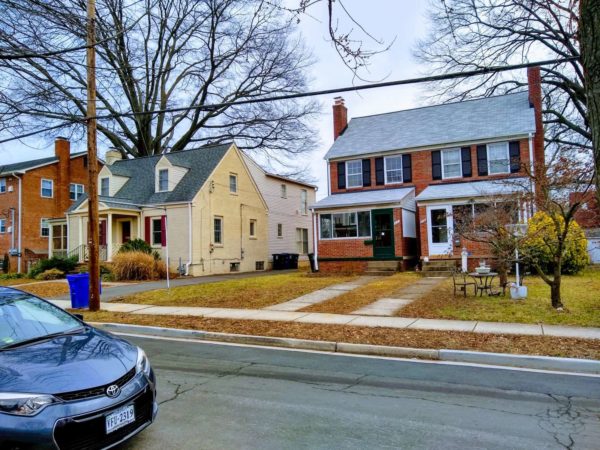(Updated at 4 p.m.) When walking from a Metro station, pedestrians often pass large apartment buildings that transition quickly to detached, single-family homes on sizable lots.
That contrast reveals two problems in Arlington County’s housing supply, says Emily Hamilton, a housing expert and advocate, and the Director of the Urbanity Project at the Mercatus Center at George Mason University.
Arlington needs to allow for more expansive urban villages around Metro stations, as well as additional housing options in between apartment buildings and detached, single-family homes, she said.
Her remarks come one month after Arlington County kicked off its “Missing Middle Housing Study,” which is examining whether the county should introduce housing types that have been typically prohibited from many neighborhoods.
Hamilton commended Arlington as a national model for transit-oriented development, since it allows dense, multi-family apartment buildings within one-quarter mile of the Metro stations on the Rosslyn-Ballston corridor. But the County never changed the zoning ordinances to fully bring the plan to fruition, and she said it needs to.
“Ahead of Metro’s arrival in Arlington, county policymakers adopted the well-known ‘bulls eye approach’ to planning, which calls for dense development surrounding the Rosslyn-Ballston corridor Metro stations,” she wrote on the website Market Urbanism earlier this month. “Unfortunately, this plan has never been realized in the zoning ordinance.”
“The County maintains single-family or townhouse zoning within one-quarter mile of four stations on this corridor and a relatively low-density multifamily zone within one-quarter mile of the Rosslyn station,” she continued. “The County needs more townhouses and low-rise multifamily housing, but it also needs more high-rise multifamily housing as the bulls eye plan recognized. Given the high and rising land values and house prices along this corridor, it’s past time to realize this decades-old planning objective.”
“People are willing to walk a quarter-mile to a half-mile for transit generally, and farther for heavy-rail stations like the Metro,” Hamilton told ARLnow in a subsequent interview. At least an extra block or two could be converted into denser housing around the stations in Ballston, Virginia Square, Clarendon, Courthouse and Rosslyn, she said.
One such opportunity is in the Lyon Village neighborhood near Clarendon.
“North of the Clarendon Metro station is the largest chunk of that quarter-mile circle where there is low-density housing, and of course, that is where the single family homes are extraordinarily expensive,” said Hamilton. “It’s certainly a spot where denser development would make economic sense.”
Another example of low-density development around Metro is at East Falls Church, where there are single-family homes across the street from the station. A development plan for the area approved in 2011 but fizzled out, after facing strong opposition from local residents.
“There is a big opportunity” to build multi-family housing in the East Falls Church area, Hamilton said. New development would encourage more people to take Metro to work, and would have a positive overall environmental impact by cutting down on driving, she said.
While transit-oriented development has many positives, the relative lack of a middle ground between big apartment and condo buildings and single-family homes is “extremely stark,” Hamilton said.
“There is a missing price point in Arlington both because of the county’s high-income and the region’s unwillingness — compared to other coastal regions — to permit multi-family housing,” she said.
Recent calls to rezone some neighborhoods to allow smaller-scale multi-family homes would not outlaw single-family homes, Hamilton said. Rather, owners would be allowed to replace or convert houses into duplexes and townhouses, if they so choose. Still, the prospect of rezoning has already prompted opposition, making any changes an uphill battle politically.
Many homeowners feel that apartment buildings should be built in other neighborhoods, not their own. That has been reinforced by Arlington’s transit-oriented development patterns, which have left large swaths of the county occupied primarily by single-family homes.
“There’s been an implicit agreement that that is how it’s going to stay,” she said.
This leaves families who cannot afford single-family detached homes with relatively few options in Arlington. Some smaller, cheaper, mid-century houses are left, but those are increasingly being torn down and replaced with large, luxury homes. Current zoning and local economics do not incentivize the creation of new starter homes.
“Land costs are just too high to support that,” Hamilton said.
New starter homes could be duplexes or townhouses, but in order to realize this, the county must not only rezone, but also make it easier for developers to increase the square-footage allowed on a given lot, she said. Otherwise, builders would need to squeeze two to four families into the same surface area once reserved for one family, which makes multi-family homes impractical and expensive to build.
“There’s been a disappointing level of building duplexes and triplexes relative to what reformers hoped for, because they have to be limited to the size of the house that could’ve been built there for one family,” she said.
Hamilton also submitted her ideas to the Housing Arlington Call for Ideas. The county is looking for advocates, researchers, and federal, state and municipal professionals with ideas for land use and zoning approaches, as well as new financing models or partnerships that could reduce costs to the county.
The new deadline for responses is Dec. 11.


